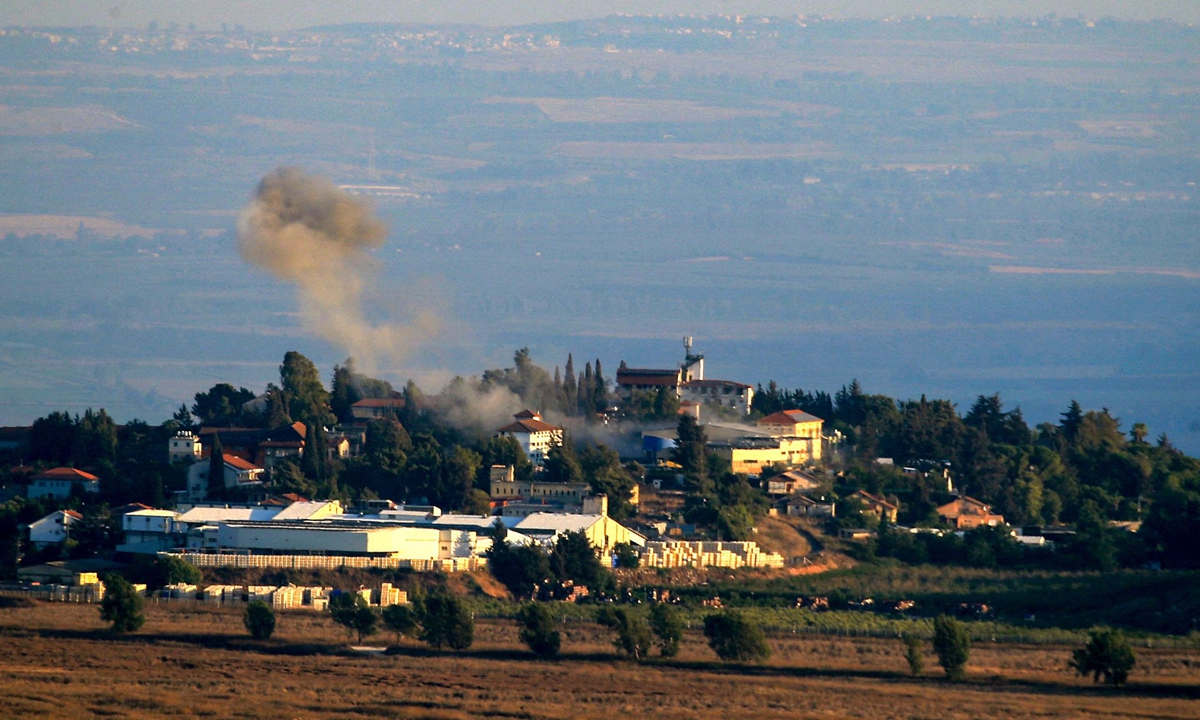
A photo taken from a position in southern Lebanon, close to the border with Israel shows smoke billowing from the site of a rocket fired from the Lebanese side towards the Israeli village of Metullah on August 3, 2024, amid ongoing cross-border clashes between Israeli troops and Hezbollah fighters. Photo: VCG
The likelihood of conflicts spilling over in the Middle East continues to rise as Hezbollah said on Sunday it had launched dozens of Katyusha rockets at Israel with Iran reportedly expected to attack Israel as early as Monday. A potential direct confrontation between Iran and Israel has emerged as the most significant manifestation of the spillover effects of the Palestine-Israel conflict, yet given Iran's domestic and international situation, an all-out war with Israel seems unlikely, said experts.
Three US and Israeli officials told US media Axios that they expect Iran to attack Israel as early as Monday. Iranian and Hezbollah officials have vowed to retaliate for the assassinations of Hezbollah's top military commander Fuad Shukr and Hamas political leader Ismail Haniyeh.
Experts expect any Iranian retaliation could potentially be larger in scope than the one in April as it could also involve Hezbollah.
Hezbollah said Sunday it had launched dozens of Katyusha rockets at northern Israel in response to Israel's attacks on southern Lebanon, according to Lebanon's Al Manar TV.
A potential direct confrontation between Iran and Israel has emerged as a pivotal manifestation of the spillover effects of the longstanding Palestine-Israel conflict in the region, Liu Zhongmin, a professor at the Middle East Studies Institute of Shanghai International Studies University, told the Global Times.
Liu said that there is a risk of the conflict spreading beyond the borders of Israel and Palestine, potentially leading to a larger war in the Middle East.
Several countries, including the US and UK, urged their citizens to leave Lebanon while commercial transportation options are still available, amid fears that conflicts between Israel and Hezbollah could escalate, media reported.
Although the assassination of Haniyeh on Iran's soil is a blatant provocation to Tehran and will trigger Iran's fierce fightback, given Iran's current domestic and international situation, it's unlikely that an all-out war will break out between Iran and Israel, Liu said.
The US is boosting its forces in the Middle East in preparation for a possible Iranian attack against Israel and sending more warships and fighter jets to the region, the Pentagon said on Friday, according to Axios.
Wang Jin, an associate professor at the Institute of Middle Eastern Studies of Northwest University, told the Global Times that the US military deployment is adding fuel to the fire.
"What should be done now is mediation and coordination, especially persuading Israel not to take such extreme actions. The US should do more than just send troops, it should engage deeply and fulfill its obligations in the Middle East," Wang told Global Times.




